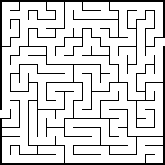Latent learning
Latent Learning[edit | edit source]
Latent learning is a form of learning that occurs without any obvious reinforcement of the behavior or associations that are learned. It is a concept in psychology and cognitive science that suggests that learning can take place without immediate evidence of that learning in behavior.
History[edit | edit source]
The concept of latent learning was first introduced by Edward C. Tolman, an American psychologist, in the early 20th century. Tolman conducted experiments with rats in mazes to demonstrate that learning could occur without reinforcement. In his experiments, rats were allowed to explore a maze without any reward. Later, when a reward was introduced, the rats were able to navigate the maze more quickly, suggesting that they had learned the layout of the maze during the initial exploration phase.
Mechanism[edit | edit source]
Latent learning involves the acquisition of knowledge that is not immediately expressed in an overt response. This type of learning is often contrasted with operant conditioning, where behavior is shaped by reinforcement or punishment. In latent learning, the knowledge is stored and can be used later when it becomes relevant or when a reward is introduced.
Examples[edit | edit source]
One classic example of latent learning is the cognitive map theory proposed by Tolman. In his experiments, rats developed a mental representation of the maze, which they used to find the shortest path to the reward when it was introduced. This demonstrated that the rats had learned the maze layout without any direct reinforcement.
Another example can be seen in human learning. For instance, a person might learn the layout of a new city by exploring it without any specific goal. Later, when they need to find a particular location, they can use the knowledge they acquired during their exploration.
Significance[edit | edit source]
Latent learning challenges the traditional behaviorist view that learning is solely a result of reinforcement. It suggests that organisms can acquire information about their environment even in the absence of rewards, and this information can be used to guide future behavior. This has important implications for understanding how learning occurs in both animals and humans.
Related Pages[edit | edit source]
Search WikiMD
Ad.Tired of being Overweight? Try W8MD's physician weight loss program.
Semaglutide (Ozempic / Wegovy and Tirzepatide (Mounjaro / Zepbound) available.
Advertise on WikiMD
|
WikiMD's Wellness Encyclopedia |
| Let Food Be Thy Medicine Medicine Thy Food - Hippocrates |
Translate this page: - East Asian
中文,
日本,
한국어,
South Asian
हिन्दी,
தமிழ்,
తెలుగు,
Urdu,
ಕನ್ನಡ,
Southeast Asian
Indonesian,
Vietnamese,
Thai,
မြန်မာဘာသာ,
বাংলা
European
español,
Deutsch,
français,
Greek,
português do Brasil,
polski,
română,
русский,
Nederlands,
norsk,
svenska,
suomi,
Italian
Middle Eastern & African
عربى,
Turkish,
Persian,
Hebrew,
Afrikaans,
isiZulu,
Kiswahili,
Other
Bulgarian,
Hungarian,
Czech,
Swedish,
മലയാളം,
मराठी,
ਪੰਜਾਬੀ,
ગુજરાતી,
Portuguese,
Ukrainian
Medical Disclaimer: WikiMD is not a substitute for professional medical advice. The information on WikiMD is provided as an information resource only, may be incorrect, outdated or misleading, and is not to be used or relied on for any diagnostic or treatment purposes. Please consult your health care provider before making any healthcare decisions or for guidance about a specific medical condition. WikiMD expressly disclaims responsibility, and shall have no liability, for any damages, loss, injury, or liability whatsoever suffered as a result of your reliance on the information contained in this site. By visiting this site you agree to the foregoing terms and conditions, which may from time to time be changed or supplemented by WikiMD. If you do not agree to the foregoing terms and conditions, you should not enter or use this site. See full disclaimer.
Credits:Most images are courtesy of Wikimedia commons, and templates, categories Wikipedia, licensed under CC BY SA or similar.
Contributors: Prab R. Tumpati, MD

